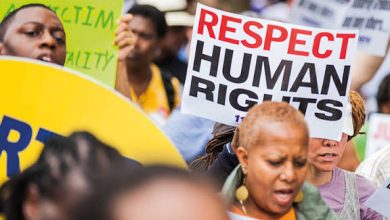“October 20: The Day of Reckoning — Nigeria Must Choose Its Fate”

By Passman Akpos/Tarakirivoice Editorial Team
The Stage Is Set
In three days’ time, on October 20, 2025, Nigerians across the land stand on the cusp of a moral confrontation. The call by human rights activist Omoyele Sowore for the #FreeNnamdiKanuNow protest is no longer a distant idea — it has become a litmus test for our national soul.
For years, Nigerians have watched the twin tragedies of injustice and impunity—courts issuing judgments, yet government refusing to comply; citizens pleading for fairness, only to be trampled in silence. Nnamdi Kanu’s prolonged detention despite court orders is a symbol of a system gone wrong.
On October 20, the protest is scheduled to begin at 7 a.m. from designated gathering points, culminating in a march to the Presidential Villa in Abuja. Sowore has pledged the march will be peaceful and lawful. The dream: to stand in unity, to demand that the rule of law not be a hollow phrase, to make visible to the world that Nigerians will no longer accept tyranny wrapped in “security concerns.”
But what will the day really look like?
How the Day Might Unfold
Early Morning: Gathering, Vigilance, Determination
At dawn, activists, youths, professionals, and ordinary citizens will converge — in cities, towns, and villages — bearing placards, drums, voices. The air will crackle with expectation. In corridors of apartment blocks, people whisper: “We will go. Today. Enough is enough.”
As people move, social media will swell — livestreams, calls for calm, maps of safe routes, warnings of “infiltrators,” appeals for unity. Many will come clad in white (peace), others in red (resistance). Some will carry images of Nnamdi Kanu, others the words of court judgments unconscionably ignored.
In Abuja, the march’s path will be lined with security forces, checkpoints, barricades. Journalists and lawyers will follow on the flanks, ready to bear witness. The mood will be hopeful, tense, electric.
Midday: Confrontation or Compromise
By midmorning, the march reaches its crescendo. Protesters surround the gateway of the Presidential Villa — drums echoing, songs rising, chants of “release him now” reverberating. Speeches ring out: from Sowore, from legal luminaries, from the youth. They recite the court rulings, demand compliance.
At that point the government must decide: will it open its doors to dialogue and release people to their constitutional rights, or will it treat this as a threat to be crushed?
If the government yields — even partially — and allows a delegation in, tension may deflate into negotiation. If they resist and order security agents to clamp down, the fault lines will fracture.
Afternoon: The Moment of Truth
If force is used — tear gas, water cannons, baton charges, arrests — the scene will darken. The cry of “No more — enough!” will morph into the clang of metal, the panic of retreating crowds, the wails of the wounded. The day meant for justice becomes battlefield. Blood may stain the pavement; some will fall but many will stand. The eyes of the people will burn with fury.
But if restraint is maintained — security forces holding back, letting the people assemble, adopting a posture of observer rather than oppressor — the day may conclude with a fragile victory: protesters dispersing peacefully, but the message broadcast loud — “We are here. We will not be silenced.”
Evening: Aftermath, Resolve, and Reckoning
As the sun sets, Nigerians will count the toll: how many arrested, injured, missing. Lawyers will file writs; civil society groups will call out violations; social media will flood with testimonies, videos, heartbreak, indignation.
If force was used, anger will ferment overnight. The government may attempt a crackdown — shutting down the internet, curfews, selective arrests. But the seed of revolution will have been watered. Citizens in Lagos, Port Harcourt, Kano, Onitsha, Aba, Warri — everywhere — will stir. The narrative will shift: this was not an isolated protest, this was the opening salvo of a new wave.
If restraint held, the government might claim a “win” — that Nigeria remained peaceful, that protest was lawful — and pledge minimal concessions: a committee, review, inquiries. But the people will be watching; they will know if the promises ring hollow.
How the Government May React — Force or Dilemma?
The Nigerian government is already speaking. Bayo Onanuga, Special Adviser to the Presidency, has condemned the planned protest as a threat to law and order. He labeled Sowore an “anarchist masquerading as a rights activist,” saying the march would interfere with the ongoing trial. The Presidency may posture tough, promising that security agencies “will not allow breakdown of order.” The state will frame the event as “political mischief” or “agenda-driven.”
Yet, behind the scenes, the government faces a dilemma:
If it uses brutal force, it risks martyring Kanu, inflaming every region, provoking international condemnation, emboldening the opposition, and unleashing a spiral of unrest.
If it listens and concedes, even partially — ordering Kanu’s release, promising judicial compliance — it risks being seen as weak, compromising the narrative of “strong government,” and emboldening more demands.
Thus, the most likely path is a mixed response: deploy riot squads, armored vehicles, selective arrests; but hold back the worst guns; try to disrupt the march with barricades and pseudo‑negotiation; cut internet, clamp down media; arrest protest leaders and declare an emergency in certain areas.
If they miscalculate and overreach — say, open fire on peaceful marchers — the backlash will be immediate and ferocious. The government’s legitimacy would collapse further in the eyes of many.#If Force Is Used — What Then?
If the government orders force:
1. Protesters will not disperse easily. Mass defiance — turning makeshift shields from umbrellas, clothing, bodies, banners — will resist tear gas and baton charges.
2. Casualties will be high. Though the regime may suppress media and control narrative, videos will leak — of wounded, bleeding, lifeless bodies — stirring nationwide outrage and international pressure.
3. The narrative flips. The government exposes its cruelty; protesters become heroes, martyrs; the moral high ground swings to the people.
4. Escalation is inevitable. If areas beyond Abuja join, cities could erupt into simultaneous protests. Strikes, boycotts, civil disobedience could spread like wildfire.
5. Fragmentation within security forces. Some officers, appalled, may refuse orders; some may sympathize publicly; cracks open in the facade of monolithic control.
6. International pressure intensifies. Diaspora Nigerians, human rights bodies, foreign governments will demand investigation, sanctions, accountability.
In short: force will not suppress the people’s cry — it will amplify it. The government may think it can contain one city, one march. But in Nigeria, when one city trembles, the rest trembles too.
The Spark of Revolution Is Alive
The protest of October 20 is not merely about one man — Kanu. It is about whether Nigerians will tolerate selective justice, arbitrary power, and the hollow promise of democracy. It is about making clear that we will no longer be subjects in a country ruled by fear.
Yes, the anger is real. Years of broken promises, systemic corruption, insecurity, institutional decay — all conspire to make this a moment of rupture. The people are no longer willing to whisper; they are ready to roar.
Let this editorial be a clarion call:
To Nigerians — go out. Be visible. Be peaceful. Be many. Let the march be your testimony. Let each footstep say: “We will not be intimidated.”
To security agents — you are the shield, not the sword. You swore to protect citizens. Do not become your own enemy. The world is watching your choices.
To the government — heed the voice of history. Do not let the drift to despotism be the legacy you leave. The path of concession and reconciliation is narrow — take it now, before you are pushed into ruin by your own violence.
To every journalist, lawyer, priest, teacher — your duty is to expose truth, defend the weak, comfort the oppressed. The day will demand your courage.
Let October 20 be a turning point: not just for Nnamdi Kanu’s freedom, but for Nigeria’s rebirth. When the people rise and refuse to bow, the power of tyranny begins to crack.
When history is written, may it say: on that day, Nigerians remembered their dignity; they stood in the sun; they challenged the monstrous lie that the state is above justice. May God grant us courage, clarity, and strength.
Rise, Nigeria. Rise.
I’M PASSMAN AKPOS
(The Militant with a pen)
Tarakirivoice Editorial Team





